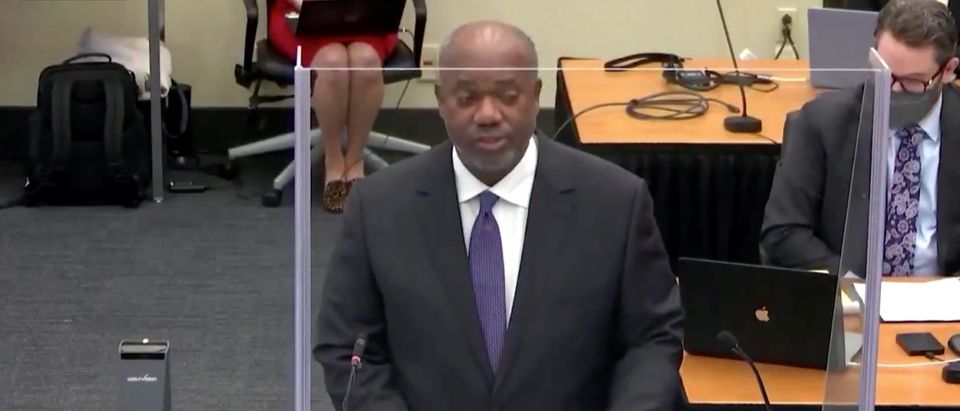After the defense and the prosecution made their opening statements during the first day of the Derek Chauvin trial, it became clear the case would focus on George Floyd’s cause of death.
Chauvin, the former Minneapolis Police Officer accused of killing Floyd, faces charges of second-degree murder, second-degree manslaughter and potentially third-degree murder. Floyd’s death sparked nationwide protests, some of which erupted into riots.
Now, national attention has turned to Chauvin’s trial. (RELATED: Here’s How Derek Chauvin Plans To Defend Himself)
Jerry W. Blackwell, the prosecuting attorney, began his opening arguments by showing photos of Chauvin kneeling on Floyd’s neck and pointing out that Floyd said “I can’t breathe” before he died. Blackwell said Floyd suffered anoxic seizures, which is the body’s automatic reflex when breathing has stopped due to oxygen deprivation, and involuntary gasping from oxygen deficiency.
Former Minneapolis police officer Derek Chauvin did ‘not let up’ after he was told that George Floyd did not have a pulse, continuing to leave his knee on Floyd’s neck, a prosecutor told jurors in his opening statement at Chauvin’s murder trial https://t.co/J0SzOUIoC7 pic.twitter.com/c1YW8GJS81
— Reuters (@Reuters) March 29, 2021
Blackwell also told the jury Chauvin continued to kneel on Floyd’s neck as he was told that Floyd’s pulse couldn’t be found and after the ambulance had arrived.
“If I had to give this part of the evidence that you are going to see a name, I would tell you that you can believe your eyes that it’s a homicide, it’s murder,” Blackwell said. “You can believe your eyes.” The last nine minutes of Floyd’s life “matches the patterns of somebody who dies from oxygen deficiency,” the prosecutor said.
“This was for example not a fatal heart event,” Blackwell continued. “This was not for example a heart attack. You will learn that there was no demonstrated injury whatsoever to Mr. Floyd’s heart, as in a heart attack.” (RELATED: Monday Noon Dispatch: Derek Chauvin’s Trial Begins — What To Expect?)
Blackwell continued to emphasize Floyd did not die from a heart-related condition such as a blood clot or heart arrhythmia. He told the jury that despite Floyd suffering from opioid addiction, he did not die from an overdose, disputing the argument that Floyd had a fatal level of fentanyl in his system. Blackwell claimed that Floyd had a higher tolerance level for drugs due to his struggle with addiction, noting his cause of death was listed on the medical report as a “homicide.”
Eric J. Nelson, the defense attorney representing Chauvin, said that information about Floyd’s death provided by Hennepin County Chief Medical Examiner Andrew Baker is “extremely important” in determining the cause of death.
Nelson said that Baker found “none of the telltale signs of asphyxiation” and “no bruises to Mr. Floyd’s neck, either on his skin or after peeling his skin back to the muscles underneath.”
The defense attorney added there was “no evidence that Mr. Floyd’s airflow was restricted.” A toxicology screen of Floyd’s blood showed the presence of fentanyl, methamphetamine and “other things,” according to Nelson. Floyd’s autopsy also revealed other issues such as coronary disease, an enlarged heart, a tumor, and swelling of the lungs.
“This will ultimately be another significant battle in this trial,” Nelson said. “What was Mr. Floyd’s actual cause of death?”
“The evidence will show that Mr. Floyd died of a cardiac arrhythmia that occurred as a result of hypertension, his coronary disease, the ingestion of methamphetamine and fentanyl, and the adrenaline flowing through his body, all of which acted to further compromise an already compromised heart,” Nelson concluded.
Independent pathologists hired by Floyd’s family claim the cause of his death was asphyxia.


